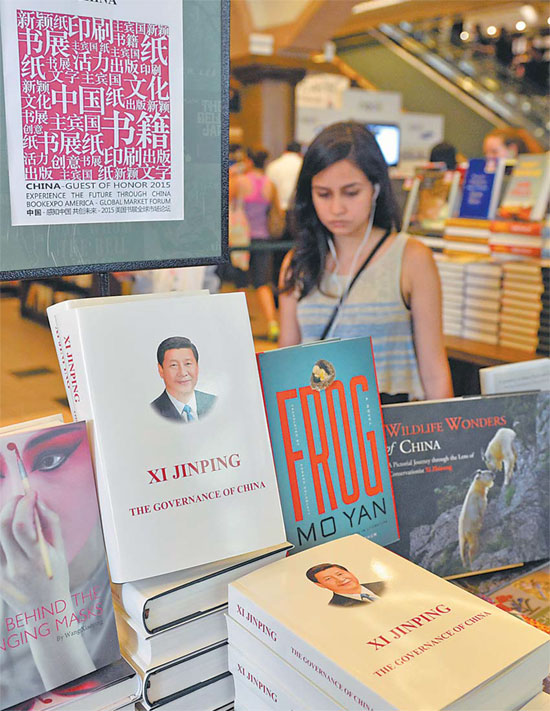To understand China, go beyond the Web
Internet is 'chief source' of information on China, but experts say face-to-face exchanges are vital
Dirk Nimmegeers reads masses of reports on China every day for his job, but he has been particularly looking forward to sitting down to a copy of Xi Jinping: The Governance of China.
"In (the book), the Chinese president explains many different and important principles of what he's thinking," he says. "I want to know the political ideas of the Chinese leadership. This book will help me see the future of China."
|
Xi Jinping: The Governance of China on sale at Barnes & Noble, the world's largest book seller, in New York. Wang Lei / Xinhua |
Nimmegeers is editor of Chinasquare, a website run by the Confucius Institute in Brussels that posts information about China. He spends most days going through reams of text about the country, including in the Chinese media and on official websites.
"I try to hear more voices about China and take it all in," he says, adding that cyberspace has become an important tool to help foreigners better understand China and its culture.
According to a report by Beijing Institute of Culture Innovation and Communication on June 7, almost two-thirds of foreigners see the Internet as the chief source of information on China, followed by newspapers and television.
The report, based on a survey of 2,407 people in Britain, the United States, France, Australia, Japan and South Korea, said most respondents prefer to watch Chinese performances, movies and TV on video-streaming websites, while more than 40 percent said they would rather join a Chinese cultural activity online than actually visit the country.
Although the Internet can help broadcast Chinese culture throughout the world, Song Jingwu, vice-president of the Chinese People's Association for Friendship with Foreign Countries, says face-to-face communication is still vital to ensuring people overseas gain a deep understanding of the country, and vice versa.
His organization last year arranged for five Chinese university students and five from Britain to team up and make 10 short films about each other's nations.
"We got some very positive feedback," Song says, explaining that, during the production process, the young people clearly understood each other from what they said and how they behaved, and that such communication can reduce unnecessary misunderstandings in the two countries.
Song also praised the activities organized by the Society of Anglo-Chinese Understanding, a non-governmental body that in May marked its 50th anniversary, for promoting friendship between the people of Britain and China.
"The association provides facts and analysis about China, and calls on those who have traveled to China or who work there to share their experiences with people who have never been, which can help more British people to understand the past, present and future of China," he says.
The Web is a good platform for spreading information and making friends in other countries, "but it can't replace face-to-face dialogue, as deeper understanding is based on how much we get along with each other," he adds.
Song's department is now arranging another multimedia project involving Chinese and British students focused on the Silk Road, the ancient trading route between China and Europe, to help both groups understand Chinese history and to motive their interest in its culture.
Nimmegeers says some people see China through a distorted lens, which is a situation the Chinese government needs to change not only through activities, but also by offering more information when dealing with high-profile incidents.
"The government has realized the importance of soft power, and it is already doing many things, but it's far from enough," he says.
According to the Beijing institute's survey, China's image has improved thanks to the Internet, but it said many people continue to hold a skewed view of China.
About 13 percent of respondents admitted to having a poor understanding of the Chinese culture; 60 percent said it was fair; 15 percent good; almost 5 percent very good; and 6 percent excellent.
The Internet is clearly a platform to arouse foreign interest in China, but to develop a deep understand ing requires encouragement for them to travel to the country, to look, find and feel, adds Nimmegeers, who plans to visit China for the first time next year.
Zhang Ruoning, deputy director-general of the friendship association's European department, a basic, mutual understanding is a vital foundation of any equal dialogue.
"If China wants a voice in the world and wants foreign partners to know why it takes certain actions, it needs to ensure information is exchanged smoothly and to increase face-to-face activities, such as cultural performances and exhibitions," she says.
"This year we're planning a cooperative performance that incorporates Shakespearean drama and Chinese operas, hoping to light sparks of cultural communication."



















